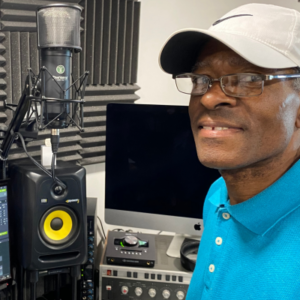Robert Bateman was in charge of sound recording from 1959 to 1962. He was probably responsible for acquiring the company’s first recording equipment, a tape machine bought from the WJLB radio station and he was chief engineer for all the early hits on Tamla and Motown, as well as being a songwriter, producer and talent scout.
Bateman was born in Chicago, Illinois, in 1936. He was only twenty-three when he came to Motown to work, first as a backing singer with Rayber Voices and then as a sound engineer. He was also a founding member of the Satintones, who cut their first tracks at Motown in 1959, and also a successful songwriter.

His first credit as producer came in 1961, when a song he had co-written (with Brian Holland, Georgia Dobbins, Freddie Gorman and William Garrett) was recorded by the Marvelettes and became Motown’s first number one hit. “Please Mr. Postman” was produced by Bateman and Brian Holland, credited as Brianbert, which was a mightily impressive start! He co-wrote and produced some of the Marvelettes later singles.
In early 1962, an opportunity arose at Wilbert Golden’s new Correc-Tone label, which was being set up in Detroit. Bateman was offered $150 per week, to set up and run the new studio and to write and produce songs. Mickey Stevenson knew all about the offer, as he had quietly been advising Mr. Golding, and he prompted Bateman to take the job. Other Motown musicians were also tempted to get involved.
In 1963, however, Bateman left Correc-Tone and went to New York, to work with Wilson Pickett at Capitol Records. He later returned to Detroit to work. Bateman died aged eighty in 2016.
Mike McLean started at Motown in 1961, at the age of twenty. In an open letter to Bob D’Orleans included on the Golden World Story on the Soulful Detroit website, McLean has described the help that Motown received in the early years from Alan Stevens of RCA Custom Records when they trying to perfect the acoustic qualities of Studio A. The final result created by Stevens was an excellent acoustic space but one that was very cramped. Not surprising, when you consider that the studio was built in the garage under the house.

Since space in Studio A was limited, McLean built a system that avoided the use of individual amps for the various instruments. Instead of the guitarists using their own amps, each instrument would be plugged into a five-channel pre-amp. The unit McLean constructed also housed a MacIntosh amp and an Altec speaker, which allowed the sound being recorded to be fed back into the studio for the musicians to hear. The sound from the pre-amp was also fed directly into the mixing console. It was a neat solution to the problem of space. The tube pre-amp was used from 1966 until 1972, and a version (the MTP-66) is now commercially available.
Lawrence Horn, born in 1939, had an unusual introduction to the music industry. After graduating from Cass Technical High School in the late fifties, he worked as a young DJ on the USS Lake Champlain ship’s radio station. Horn was born in West Detroit, the son of a baker. Like many young Black men, he joined the navy to improve his career prospects and received training as an electrical engineer, as well as playing the latest hits by Ray Charles, Sam Cooke and other R&B singers.

On completion of his service in late 1962, he returned to Detroit and found a job at Motown working as a sound engineer. He was just twenty-two years old. His weekly pay was fifty dollars a week, but Berry Gordy liked him and was impressed by his knowledge of music. Together with Mike McLean, Horn was soon raising the quality of the recordings coming out of Studio A.

















